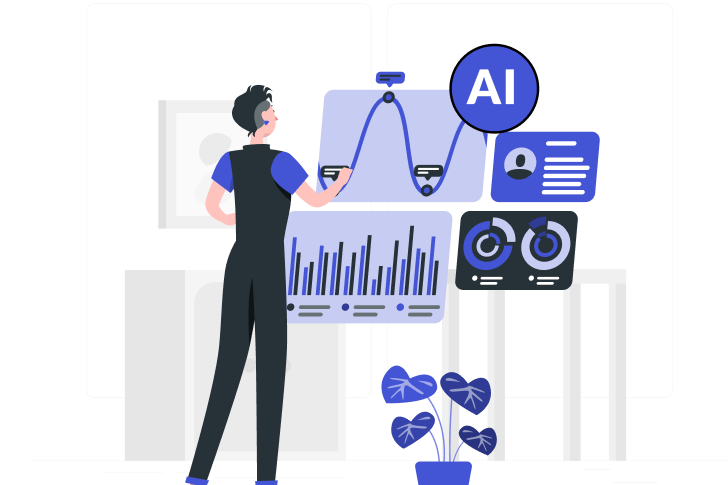Generative AI for Governance: The Next Leap in Citizen Services
In the ever-evolving landscape of public administration, the core mission remains constant: to serve citizens effectively, efficiently, and equitably. However, traditional governance models often grapple with challenges like information accessibility, bureaucratic delays, language barriers, and the sheer scale of diverse citizen needs. Today, Generative AI (GenAI) presents a transformative opportunity to redefine citizen services, making them more responsive, personalized, and inclusive.
At Wohlig, we've been privileged to partner with government bodies, witnessing firsthand how strategic AI implementation can revolutionize public service delivery. Our experiences, including developing AI-powered multilingual search systems for the Maharashtra Government and implementing comprehensive AI solutions for enhanced citizen engagement with the Gujarat Government, have solidified our belief: GenAI is not just a technological advancement; it's the next leap towards citizen-centric governance.
The Current Challenges in Citizen Service Delivery
Before diving into GenAI's potential, it's crucial to acknowledge the hurdles:
Information Overload & Silos: Citizens often struggle to find relevant information scattered across multiple government websites and departments.
Accessibility Barriers: Language differences and varying levels of digital literacy can exclude segments of the population.
Inefficient Processes: Manual, paper-based processes can lead to delays and frustration for citizens seeking services.
Lack of Personalization: Generic service delivery often fails to address the unique circumstances and needs of individual citizens.
Resource Constraints: Government agencies often operate with limited resources, making it difficult to scale services effectively.
How Generative AI is Reshaping Governance
Generative AI offers innovative solutions to these longstanding challenges by enabling:
Intelligent Information Access & Dissemination:
AI-Powered Multilingual Search: As demonstrated in our work with the Maharashtra Government, GenAI can power sophisticated search engines that understand natural language queries in multiple languages (e.g., English, Hindi, Marathi). This allows citizens to easily find information on government schemes, services, and regulations in their preferred language.
Conversational AI & Chatbots: Intelligent virtual assistants can provide 24/7 support, answer citizen queries, guide them through processes, and offer personalized information, significantly reducing the burden on human staff and improving response times. Wohlig's expertise in RAG (Retrieval-Augmented Generation) architectures, similar to what we've applied in projects like the ONDC chatbot, can ensure these chatbots provide accurate and contextually relevant information drawn directly from official sources.
Enhanced Citizen Engagement & Participation:
Personalized Communication: GenAI can help governments tailor communications to specific citizen segments based on their needs, demographics, and past interactions, making outreach more effective.
Automated Service Delivery: Routine applications and requests can be processed and fulfilled with AI assistance, speeding up service delivery for things like permit applications, benefit claims, and information requests.
Sentiment Analysis & Feedback Collection: GenAI can analyze citizen feedback from various channels (social media, emails, forums) to help governments understand public sentiment, identify emerging issues, and improve services proactively.
Streamlined Internal Operations & Policy Making:
Document Summarization & Analysis: GenAI can quickly summarize lengthy policy documents, legal texts, and reports, enabling faster decision-making and knowledge dissemination within government agencies.
Data-Driven Policy Insights: By analyzing vast datasets, GenAI can help identify trends, predict needs, and support evidence-based policymaking.
Workflow Automation: Automating routine administrative tasks frees up public servants to focus on more complex, citizen-facing responsibilities.
Wohlig's Experience: Partnering for Progress
Our collaborations with government entities have provided valuable insights into the practical application of AI in the public sector. Key learnings include:
The Criticality of Data Quality: The success of any AI system, especially in governance, hinges on the quality, accuracy, and integrity of the underlying data.
User-Centric Design: Solutions must be designed with the diverse needs and capabilities of all citizens in mind, ensuring ease of use and accessibility.
The Importance of Multilingual Support: In diverse nations like India, providing services in regional languages is paramount for inclusivity.
Building Trust through Transparency: Clearly communicating how AI is being used and ensuring data privacy are crucial for public acceptance. (Referencing Wohlig's broader commitment to Responsible AI).
For the Gujarat Government, our focus was on implementing comprehensive AI solutions to transform citizen services and enhance engagement. This involved a multifaceted approach, looking at various touchpoints where AI could improve efficiency and citizen satisfaction.
Benefits of GenAI-Powered Governance
The adoption of Generative AI in governance offers a multitude of benefits:
For Citizens:
Faster access to information and services.
More personalized and convenient interactions.
Reduced language and accessibility barriers.
Increased transparency and engagement in civic processes.
For Government Agencies:
Improved operational efficiency and reduced costs.
Better resource allocation.
Enhanced data-driven decision-making capabilities.
Increased public trust and satisfaction.
The Future of Citizen Services: Smart, Inclusive, Proactive
Generative AI is paving the way for a future where government services are not just reactive but proactive, anticipating citizen needs and delivering support seamlessly. Imagine systems that can alert citizens to benefits they're eligible for, guide them through complex life events (like starting a business or accessing healthcare), or provide personalized educational resources.
Wohlig is committed to being a key partner in this transformation. We combine our deep understanding of AI technologies, including LLMs and RAG, with our experience in public sector projects to co-create solutions that are innovative, impactful, and ethically sound.
As we move forward, ensuring responsible AI deployment—addressing data privacy, security, bias, and accountability—will be paramount. The goal is not just to implement technology, but to build a more efficient, equitable, and citizen-empowered future.
Join Wohlig in exploring how Generative AI can unlock the next generation of citizen services and build a more responsive government for all.


